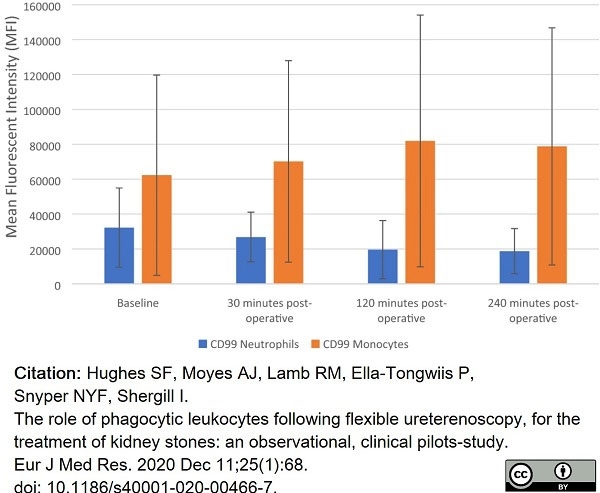CD99 antibody | DN16

Mouse anti Human CD99:FITC
- Product Type
- Monoclonal Antibody
- Clone
- DN16
- Isotype
- IgG1
- Specificity
- CD99
| Mouse anti human CD99 antibody, clone DN16 recognizes human CD99, also known as E2 antigen, MIC2 or 12E7. CD99 is a 185 amino acid ~32 kDa single pass type I transmembrane O-glycosylated glycoprotein. Three isoforms can be producted by alternative splicing. Epitope analysis of the DN16 clone suggests the antibody recognizes a minimal peptide sequence "LPDNENKK" located between residues 32 and 39 towards the N-terminal region of the molecule. This sequence is present in both isoforms I and II but is largely absent from isoform 3 suggesting that the antibody will only recognize isoforms I and II (Gil et al. 2002). CD99 expression is notable in the testis, pancreas, bone marrow, lymph nodes and spleen. CD99 is expressed on all classes of leukocytes and tends to be highest on immature cells. Functionally CD99 has been found to be involved in cellular adhesion/aggregation (Krisanaprakornkit et al. 2013) and apoptosis (Sciandra et al. 2014). |
- Target Species
- Human
- Product Form
- Purified IgG conjugated to Fluorescein Isothiocyanate Isomer 1 (FITC) - liquid
- Preparation
- MCA1850FT: Purified IgG prepared by ion exchange chromatography from ascites
- MCA1850F: Purified IgG prepared by affinity chromatography on Protein G from tissue culture supernatant
- Buffer Solution
- Phosphate buffered saline
- Preservative Stabilisers
- 0.09% sodium azide (NaN3)
1% bovine serum albumin - Approx. Protein Concentrations
- IgG concentration 0.1 mg/ml
- Max Ex/Em
-
Fluorophore Excitation Max (nm) Emission Max (nm) FITC 490 525 - Regulatory
- For research purposes only
- Guarantee
- 12 months from date of despatch
Avoid repeated freezing and thawing as this may denature the antibody. Storage in frost-free freezers is not recommended. This product is photosensitive and should be protected from light.
| Application Name | Verified | Min Dilution | Max Dilution |
|---|---|---|---|
| Flow Cytometry | Neat |
- Flow Cytometry
- Use 10μl of the suggested working dilution to label 106 cells in 100μl
| Description | Product Code | Applications | Pack Size | List Price | Your Price | Quantity | |
|---|---|---|---|---|---|---|---|
| Mouse IgG1 Negative Control:FITC | MCA928F | F | 100 Tests |
|
Log in | ||
| List Price | Your Price | ||||||
|
|
Log in | ||||||
| Description | Mouse IgG1 Negative Control:FITC | ||||||
| Description | Product Code | Applications | Pack Size | List Price | Your Price | Quantity | |
|---|---|---|---|---|---|---|---|
| Human Seroblock | BUF070A | F | 50 Test | Log in | |||
| List Price | Your Price | ||||||
| Log in | |||||||
| Description | Human Seroblock | ||||||
| Human Seroblock | BUF070B | F | 200 Test | Log in | |||
| List Price | Your Price | ||||||
| Log in | |||||||
| Description | Human Seroblock | ||||||
References for CD99 antibody
-
Hahn, J.H. et al. (1997) CD99 (MIC2) regulates the LFA-1/ICAM-1-mediated adhesion of lymphocytes, and its gene encodes both positive and negative regulators of cellular adhesion.
J Immunol. 159 (5): 2250-8. -
Choi, E.Y. et al. (1998) Engagement of CD99 induces up-regulation of TCR and MHC class I and II molecules on the surface of human thymocytes.
J Immunol. 161 (2): 749-54. -
Kim, S.H. et al. (1998) Generation of cells with Hodgkin's and Reed-Sternberg phenotype through downregulation of CD99 (Mic2).
Blood. 92 (11): 4287-95. -
Kim, S.H. et al. (2008) Viral latent membrane protein 1 (LMP-1)-induced CD99 down-regulation in B cells leads to the generation of cells with Hodgkin's and Reed-Sternberg phenotype.
Blood. 95: 294-300. -
Husak, Z. et al. (2010) Death induction by CD99 ligation in TEL/AML1-positive acute lymphoblastic leukemia and normal B cell precursors.
J Leukoc Biol. 88: 405-12. -
Husak, Z. and Dworzak, M.N. (2012) CD99 ligation upregulates HSP70 on acute lymphoblastic leukemia cells and concomitantly increases NK cytotoxicity.
Cell Death Dis. 3: e425. -
Hughes, S.F. et al. (2020) The role of phagocytic leukocytes following flexible ureterenoscopy, for the treatment of kidney stones: an observational, clinical pilots-study.
Eur J Med Res. 25 (1): 68.
- Synonyms
- MIC2
- RRID
- AB_323202
- UniProt
- P14209
- Entrez Gene
- CD99
- GO Terms
- GO:0007155 cell adhesion
- GO:0005887 integral to plasma membrane
- GO:0005737 cytoplasm
Please Note: All Products are "FOR RESEARCH PURPOSES ONLY"
View all Anti-Human ProductsAlways be the first to know.
When we launch new products and resources to help you achieve more in the lab.
Yes, sign me up